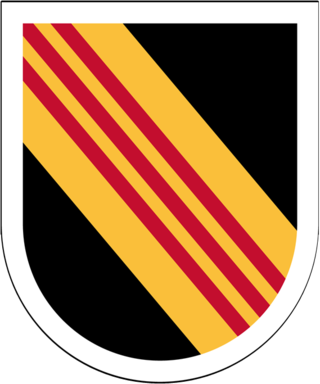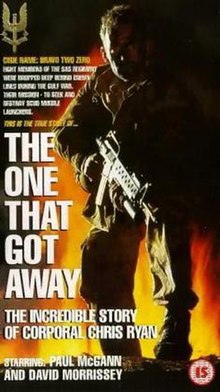
The Special Air Service (SAS) is a special forces unit of the British Army. It was founded as a regiment in 1941 by David Stirling, and in 1950 it was reconstituted as a corps. The unit specialises in a number of roles including counter-terrorism, hostage rescue, direct action and special reconnaissance. Much of the information about the SAS is highly classified, and the unit is not commented on by either the British government or the Ministry of Defence due to the secrecy and sensitivity of its operations.

The Special Boat Service (SBS) is the special forces unit of the United Kingdom's Royal Navy. The SBS can trace its origins back to the Second World War when the Army Special Boat Section was formed in 1940. After the Second World War, the Royal Navy formed special forces with several name changes—Special Boat Company was adopted in 1951 and re-designated as the Special Boat Squadron in 1974—until on 28 July 1987 when the unit was renamed as the Special Boat Service after assuming responsibility for maritime counter-terrorism. Most of the operations conducted by the SBS are highly classified, and are rarely commented on by the British government or the Ministry of Defence, owing to their sensitive nature.

The Gulf War was an armed conflict between Iraq and a 42-country coalition led by the United States. The coalition's efforts against Iraq were carried out in two key phases: Operation Desert Shield, which marked the military buildup from August 1990 to January 1991; and Operation Desert Storm, which began with the aerial bombing campaign against Iraq on 17 January 1991 and came to a close with the American-led liberation of Kuwait on 28 February 1991.

The Special Air Service Regiment, officially abbreviated SASR though commonly known as the SAS, is a special forces unit of the Australian Army. Formed in 1957 as a company, it was modelled on the British SAS with which it shares the motto, "Who Dares Wins". Expanded to a regiment in August 1964, it is based at Campbell Barracks, in Swanbourne, a suburb of Perth, Western Australia, and is a direct command unit of the Special Operations Command.

The 160th Special Operations Aviation Regiment (Airborne), abbreviated as 160th SOAR (A), is a special operations force of the United States Army that provides helicopter aviation support for special operations forces. Its missions have included attack, assault, and reconnaissance, and these missions are usually conducted at night, at high speeds, low altitudes, and on short notice.
Bravo Two Zero was the call sign of an eight-man British Army Special Air Service (SAS) patrol, deployed into Iraq during the First Gulf War in January 1991. According to Chris Ryan's account, the patrol was given the task of gathering intelligence, finding a good lying-up position (LUP), setting up an observation post (OP), and monitoring enemy movements, especially Scud missile launchers on the Iraqi Main Supply Route (MSR) between Baghdad and northwestern Iraq; however, according to Andy McNab's account, the task was to find and destroy Iraqi Scud missile launchers along a 250 km stretch of the MSR.

The Boeing Chinook is a large, tandem rotor helicopter operated by the Royal Air Force (RAF). A series of variants based on the United States Army's Boeing CH-47 Chinook, the RAF Chinook fleet is the largest outside the United States. RAF Chinooks have seen extensive service in the Falklands War, the Balkans, Northern Ireland, Iraq, and Afghanistan.
Steven Billy Mitchell, usually known by the pseudonym and pen-name of Andy McNab, is a novelist and former Special Air Service soldier.

Colin Armstrong,, usually known by the pen-name Chris Ryan, is a British author, television presenter, security consultant and former Special Air Service sergeant.

The Military Medal (MM) was a military decoration awarded to personnel of the British Army and other arms of the armed forces, and to personnel of other Commonwealth countries, below commissioned rank, for bravery in battle on land. The award was established in 1916, with retrospective application to 1914, and was awarded to other ranks for "acts of gallantry and devotion to duty under fire". The award was discontinued in 1993, when it was replaced by the Military Cross, which was extended to all ranks, while other Commonwealth nations instituted their own award systems in the post war period.

Bravo Two Zero is a 1999 two-hour television miniseries, based on the 1993 book of the same name by Andy McNab. The film covers real life events – from the perspective of Andy McNab, patrol commander of Bravo Two Zero, a British SAS patrol, tasked to find Iraqi Scud missile launchers during the Gulf War in 1991. The names of the patrol members killed were changed.
UK Joint Special Forces Selection is the selection and training process for candidates of the United Kingdom Special Forces: Special Air Service, Special Boat Service, and Special Reconnaissance Regiment. Members of the SAS and SBS undergo selection up to the award of a sand-coloured beret to SAS personnel, whereupon SBS candidates undergo further selection to qualify as Swimmer Canoeists, and SAS personnel undergo further specialist training. SRR candidates undergo the Aptitude Phase, before going on to their own specialist covert surveillance & reconnaissance training.
The history of the British Army's Special Air Service (SAS) regiment of the British Army begins with its formation during the Western Desert Campaign of the Second World War, and continues to the present day. It includes its early operations in North Africa, the Greek Islands, and the Invasion of Italy. The Special Air Service then returned to the United Kingdom and was formed into a brigade with two British, two French and one Belgian regiment, and went on to conduct operations in France, Italy again, the Low Countries and finally into Germany.

The 5th Special Forces Group (Airborne) (5th SFG (A), 5th Group) is one of the most decorated active duty United States Army Special Forces groups. The 5th SFG (A) saw extensive action in the Vietnam War and played a pivotal role in the early months of Operation Enduring Freedom. 5th Group is designed to deploy and execute nine doctrinal missions: unconventional warfare, foreign internal defense, direct action, counter-insurgency, special reconnaissance, counter-terrorism, information operations, counterproliferation of weapon of mass destruction, and security force assistance.

Soldier Five – The Real Truth About the Bravo Two Zero Mission is the third book about the Bravo Two Zero mission during the Gulf War to have been written by a member of the eight-man patrol involved.
Michael Asher is an English desert explorer, writer, historian, and storyteller. He has been acknowledged as one of the world's leading experts on the desert and its nomadic peoples. He has travelled and lived in the Sahara and the Arabian desert, published both non-fiction and fiction works based on his explorations and encounters, and presented several documentaries based on his published works.

Bravo Two Zero is a 1993 book written under the pseudonym 'Andy McNab'. The book is a partially fictional account of an SAS patrol that becomes compromised while operating behind enemy lines in Iraq, in 1991. The patrol was led by the author and included another future writer, 'Chris Ryan'.

The One That Got Away is a 1995 book written under the pseudonym 'Chris Ryan' concerning the SAS patrol Bravo Two Zero, which was dropped behind enemy lines in Iraq in 1991. The author was a member of the patrol and tells of his 8 day escape on foot to the Syrian border.
The Battle of Majar al-Kabir was the result of growing distrust between the British military and local inhabitants of south-eastern of Iraq over house searches and confiscation of personal weapons that locals felt were crucial for their self-protection. Despite a signed agreement between local people and British forces stating that the British would not enter the town, the 1st Battalion, Parachute Regiment started patrolling in the town of Majar al-Kabir on 24 June 2003 the day after the agreement was signed. The British thought the agreement was to stop the weapons searches that involved going into the houses of local inhabitants.













